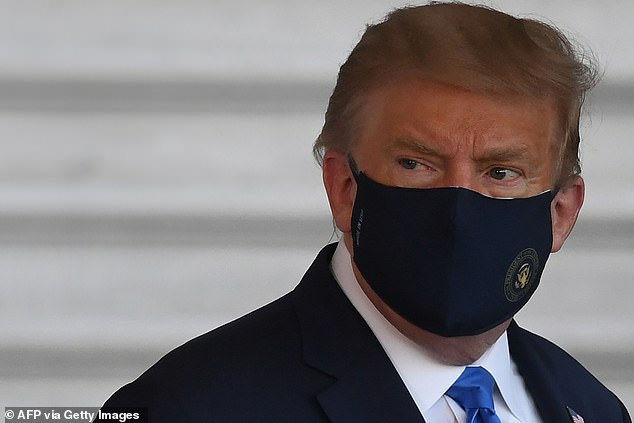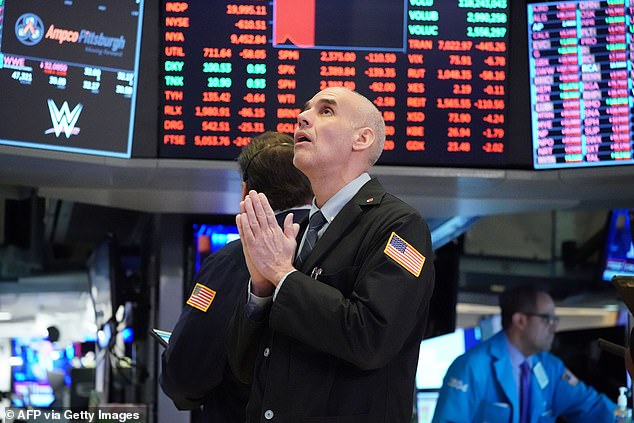HAMISH MCRAE: Sick Trump won’t infect shares – the flood of dollars will continue whoever is President
It is the biggest story in the world right now. What happens in the US matters more than anything else for our economy and our savings – and the possibility that Donald Trump might be incapacitated a month before the presidential election piles uncertainty onto uncertainty for all of us.
So what does it mean for us as investors? I don’t think it is much help for people on this side of the Atlantic to try to gauge how Trump’s illness might change the election outcome. It is much more important to focus on what will not change – and the implications for the rest of us.
One thing won’t change: US monetary policy. The Federal Reserve will continue to flood the US (and hence the world) with dollars. Interest rates will remain near zero and stay there for at least three years.

‘What happens to Trump is a huge, riveting fable – and we all want to know the next twist. But set against this technical and financial dominance of America, it is a blip’, says McRae
There would be some tweaks to tax and spending policies were Joe Biden to win the presidency, but the big numbers will not change very much. The US debt-to-GDP ratio will head above 100 per cent and the size of its national debt will continue to soar.
As money is sprayed around the US, some of those dollars will end up elsewhere in the world. In theory, that ought to mean a weaker dollar, and quite a few of the big investment banks are expecting that. But I’m not so sure.
What other currency do you choose? Where else do you invest? Any British investor who stuck to investing in UK-based companies will be feeling pretty disappointed, while if they had the nous or luck to invest in high-tech America they will be feeling rather relieved.
The Nasdaq index, which represents most of the high-tech companies, has come back a bit from its all-time high of more than 12,000 at the beginning of September, but it is still at 11,075. A year ago it was 7,800.
The wider story here is that high-tech America has been one of the great beneficiaries of Covid-19. Think of Amazon. Think of Zoom.
You may believe that the US response to the virus has been less competent than, for example, that of Germany. You would probably be right.
But the structure of the US economy, with its restless, innovative, driving high-tech giants, is more resistant to a blow such as this than that of Germany, which is trying to sell the world diesel cars.
The markets can see this. The value of Tesla is $387billion (£300billion). That of VW is about £63billion.
Markets give a snapshot of the mood of the moment, and that mood will of course change. But what I can’t see changing is US corporate dominance of our daily lives. Do we want to give up Google? Or Facebook? Or our iPhones? The answer is we can’t.
What happens to Trump is a huge, riveting fable – and we all want to know the next twist. But set against this technical and financial dominance of America, it is a blip – all right a darned big blip, but a blip nonetheless.
So what are the practical takeaways for us? There are, I suggest, two. One is that if you accept that the flood of dollars will continue whoever is President, you have to think through where those dollars will go.


‘American fiscal and monetary policy will put a floor under asset prices’, says McRae
They may not continue to go into the US share markets but they have to go somewhere. So the message I think is that American fiscal and monetary policy will put a floor under asset prices. That will in the first instance be US assets, but that will spread to the rest of the world.
Add in the flood of euros, zen, renminbi and pounds that are also being created, and there will be a floor under asset prices in general.
The other is that at some stage, maybe sooner than everyone seems to expect, inflation in goods and services will start to show through again.
In other words, asset price inflation will spread to current inflation. Costs will rise, wages will start to be bid up, and savers will find the real value of those savings whittled away.
And our own finances? The old rules still apply: set money aside, spread your risk across a wide range of investments, and rely on compound interest to grow the wealth.
Presidents change and policies change; the rules of financial planning stay the same.

